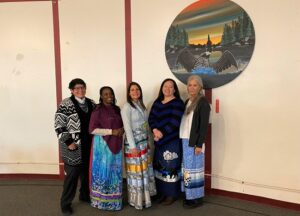New partnership instated to explore efficacy of traditional healing to prevent cancer

By Rick Garrick
THUNDER BAY — Lakehead University researcher Lana Ray is partnering with the Waasegiizhig Nanaandawe’iyewigamig Health Access Centre (WNHAC) in Kenora, traditional Knowledge Keepers and other researchers to look at the efficacy of using traditional healing to prevent cancer.
“We’re using an Indigenous approach, so we’re working very closely with our partners at Waasegiizhig Nanaandawe’iyewigamig [and] we’re also working with Elders and medicine people,” says Ray, principal investigator for the project, assistant professor in Indigenous Learning, and Indigenous research chair in Decolonial Futures at Lakehead University, and Red Rock Indian Band citizen. “We’re going to be doing some more localized work in terms of better understanding how colonialism is a risk factor of cancer, and then we are going to be doing some baseline work in terms of looking at the prevalence of what’s often called individual risk factors related to cancer, but that we’re framing as really symptoms of colonialism. And then what we’ll be doing is employing storytelling and then looking at the data as well at the end to see if we are seeing any decreases in those symptoms of colonialism.”
Ray and the partners, including Anna Koné, Department of Health Sciences at Lakehead University, Cindy Peltier, Faculty of Arts and Science and the Faculty of Education and Professional Studies at Nipissing University, and Walter Wodchis, Institute of Health Policy, Management and Evaluation at the University of Toronto, are receiving $1.2 million in funding from The Canadian Institutes of Health Research (CIHR) for the five-year project, which will privilege Indigenous ways of knowing and doing and tangible outcomes for Indigenous communities through the implementation of medicine camps and traditional health practitioner visits.
“We are excited to privilege Indigenous Intelligence as an effective approach to health and well-being,” says Anita Cameron, executive director at WNHAC. “Through the Mino-Bimaadiziwin research project, we will more than double access to traditional healing in our catchment area.”
The project team includes Serena Joseph, program manager at WNHAC; Kathy Bird, from Peguis in Manitoba; Katherine Fobister from Asubpeeschoseewagong; Roy Napish, from Eagle Lake; Ken Nash, from Northwest Angle 37; Jimmy Wayendowpanicken; Robert Charles Greene and Sarah Mandamin, from Iskatewizaagegan No.39; and Phyllis Shaugabay, from Washagamis Bay.
“It’s really important to work with the Elders and then also to have the medicine camps because the medicine camps are really about keeping knowledge in community where it belongs and helping to grow that,” Ray says, noting that the research project is not about documenting traditional medicines. “So that will all still remain with the knowledge holders who have been given those medicines to use — that won’t be information that will be shared as part of the research.”
Ray says they will be looking at the impacts of traditional healing during the research project.
“We are not looking to test or document any of the, for example, pharmaceutical properties within traditional medicine,” Ray says.
Ray says they are beginning to work with the Elders and knowledge holders to decide what the medicine camps will look like and whether they will rotate in communities in the Kenora area or be held in one location.
“Whenever I do research, I think it is really important to include community from the start,” Ray says. “This is actually a project that came from Waasegiizhig Nanaandawe’iyewigamig, and they had done engagement within their region so there was an identified need to expand traditional healing. It was not my idea, it came from community and then I was approached to work on the project and then to write the proposal for the funding.”

